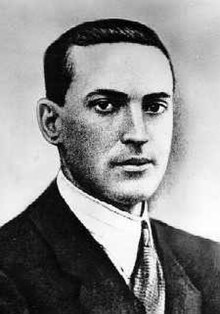Our website is made possible by displaying online advertisements to our visitors.
Please consider supporting us by disabling your ad blocker.
Cultural-historical psychology

Cultural-historical psychology is a branch of psychological theory and practice associated with Lev Vygotsky and Alexander Luria and their Circle, who initiated it in the mid-1920s–1930s.[1] The phrase "cultural-historical psychology" never occurs in the writings of Vygotsky, and was subsequently ascribed to him by his critics and followers alike, yet it is under this title that this intellectual movement is now widely known.[2][3][4] The main goal of Vygotsky-Luria project was the establishment of a "new psychology" that would account for the inseparable unity of mind, brain and culture[5] in their development (and/or degradation) in concrete socio-historical settings (in case of individuals) and throughout the history of humankind as socio-biological species. In its most radical forms, the theory that Vygotsky and Luria were attempting to build was expressed in terms of a "science of Superman",[6][7][8] and was closely linked with the pronouncement for the need in a new psychological theory of consciousness[9] and its relationship to the development of higher psychological functions. All this theoretical (mostly, speculative) and experimental empirical work was attempted by the members of the Vygotsky Circle (also referred to as "Vygotsky-Luria Circle").
- ^ Yasnitsky, A., van der Veer, R., & Ferrari, M. (Eds.) (2014). The Cambridge Handbook of Cultural-Historical Psychology. Cambridge: Cambridge University Press
- ^ Yasnitsky, A., & van der Veer, R. (2014). What is this book and what is it about? In Yasnitsky, A., van der Veer, R., & Ferrari, M. (Eds.) (2014). The Cambridge Handbook of Cultural-Historical Psychology. Cambridge: Cambridge University Press
- ^ Keiler, P. (2012). «Cultural-Historical Theory» and «Cultural-Historical School»: From Myth (Back) to Reality // PsyAnima, Dubna Psychological Journal, 5 (1), 1—33 Archived 2013-02-04 at the Wayback Machine
- ^ Keiler, P. (2018). A history of the social construction of the “cultural-historical”. In Yasnitsky, A. (Ed.) Questioning Vygotsky's Legacy: Scientific Psychology or Heroic Cult. New York & London: Routledge
- ^ Toomela, A. (2014). There can be no cultural-historical psychology without neuropsychology. And vice versa. A. Yasnitsky, R. van der Veer, & M. Ferrari (Eds.). The Cambridge Handbook of Cultural-Historical Psychology (313 - 349). Cambridge: Cambridge University Press
- ^ Yasnitsky, A. (2018). Vygotsky’s science of Superman: from Utopia to concrete psychology. In Yasnitsky, A. (Ed.). (2018). Questioning Vygotsky’s Legacy: Scientific Psychology or Heroic Cult. London & New York: Routledge.
- ^ Dr. Clay Spinuzzi blog, book review: New Myth, New World: From Nietzsche to Stalinism
- ^ Spinuzzi, C. (2018). From superhumans to supermediators: Locating the extraordinary in CHAT. In A. Yasnitsky (Ed.), Questioning Vygotsky’s legacy: Scientific psychology or heroic cult (pp. 137–166). New York, NY: Routledge.
- ^ Zavershneva, E. (2014). The problem of consciousness in Vygotsky's cultural-historical psychology. In A. Yasnitsky, R. Van der Veer & M. Ferrari (Eds.), The Cambridge Handbook of Cultural-Historical Psychology (63-97). Cambridge: Cambridge University Press
Previous Page Next Page
علم النفس الثقافي التاريخي Arabic Mədəni-tarixi psixologiya AZ Културно-историческа психология Bulgarian Psicologia cultural Catalan Kulturhistorische Schule German Psicología histórico-cultural Spanish Kulttuurihistoriallinen psykologia Finnish Théorie historico-culturelle du psychisme French सांस्कृतिक-ऐतिहासिक मनोविज्ञान HI Պատմամշակութային հոգեբանություն HY


